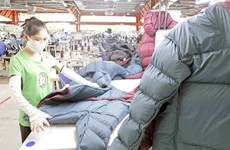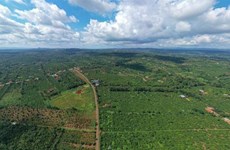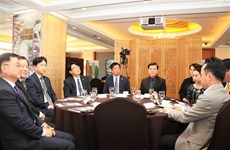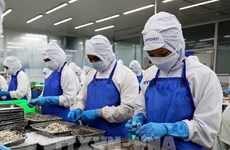Chaos marks cooking gas market
A decree regulating the price of cooking gas, which became effective
earlier this month, has failed to contain chaos on the market in HCM
City.
A decree regulating the price of cooking gas, which became effective
earlier this month, has failed to contain chaos on the market in HCM
City.
Earlier this month, following a global gas price hike, domestic gas-trading companies raised prices by 14,000-15,000 VND for each 12-kilo cylinder, with prices around 272,000 VND a cylinder.
Many customers in HCM City are paying 275,000 VND for a 12-kilo cylinder from Sai Gon Petro and VT gas, and 280,000 VND for Total gas.
Gas-trading companies have conceded that they did a poor job of managing sale prices offered by retail agents.
Retail shops are reportedly selling cooking gas at prices higher than that specified by gas companies.
Currently, most gas companies sell products via wholesale agents, who then sell to other agents and retail shops on the basis of a buy-sell contract.
This can lead to one business being an agent for different brands of gas.
While gas companies can only manage gas prices at wholesale agents, retail prices to end-users are decided by agents and retail shops.
Since every gas company has its own policy for their agents, agents will focus on promoting gas products that offer higher profits.
Le Thi Anh Man, deputy general director of the Sai Gon Petro Gas Co, said some 650 retail shops had signed contracts to sell gas produced by her company.
However, the company faces difficulties in price management of these retail agents.
If her company forced retailers to strictly follow the company's regulations, the agents would shift to another company, she said.
However, several gas agents have even filled cooking gas canisters and sold fake products, according to gas production companies.
One customer in Go Vap District said she discovered that she had purchased a fake gas canister as the gas was empty after 18 days of use instead of one month.
Late last month, police discovered many gas cylinders with a weight much lower than that listed on the cylinder at Tin Nghia II gas establishment in the southern province of Binh Duong .
The country has more than 80 gas-trading companies, but only 60 of them have a registered trademark for their empty gas cylinders.
Local task forces said fake gas accounts for 30 per cent of the total gas volume being marketed in Vietnam .
To avoid buying fake gas cylinders, customers must examine canisters to see if they are lighter than normal, have unclear logos or an inconsistent colour on the seal, according to the Market Management Department of HCM City./.
Earlier this month, following a global gas price hike, domestic gas-trading companies raised prices by 14,000-15,000 VND for each 12-kilo cylinder, with prices around 272,000 VND a cylinder.
Many customers in HCM City are paying 275,000 VND for a 12-kilo cylinder from Sai Gon Petro and VT gas, and 280,000 VND for Total gas.
Gas-trading companies have conceded that they did a poor job of managing sale prices offered by retail agents.
Retail shops are reportedly selling cooking gas at prices higher than that specified by gas companies.
Currently, most gas companies sell products via wholesale agents, who then sell to other agents and retail shops on the basis of a buy-sell contract.
This can lead to one business being an agent for different brands of gas.
While gas companies can only manage gas prices at wholesale agents, retail prices to end-users are decided by agents and retail shops.
Since every gas company has its own policy for their agents, agents will focus on promoting gas products that offer higher profits.
Le Thi Anh Man, deputy general director of the Sai Gon Petro Gas Co, said some 650 retail shops had signed contracts to sell gas produced by her company.
However, the company faces difficulties in price management of these retail agents.
If her company forced retailers to strictly follow the company's regulations, the agents would shift to another company, she said.
However, several gas agents have even filled cooking gas canisters and sold fake products, according to gas production companies.
One customer in Go Vap District said she discovered that she had purchased a fake gas canister as the gas was empty after 18 days of use instead of one month.
Late last month, police discovered many gas cylinders with a weight much lower than that listed on the cylinder at Tin Nghia II gas establishment in the southern province of Binh Duong .
The country has more than 80 gas-trading companies, but only 60 of them have a registered trademark for their empty gas cylinders.
Local task forces said fake gas accounts for 30 per cent of the total gas volume being marketed in Vietnam .
To avoid buying fake gas cylinders, customers must examine canisters to see if they are lighter than normal, have unclear logos or an inconsistent colour on the seal, according to the Market Management Department of HCM City./.













